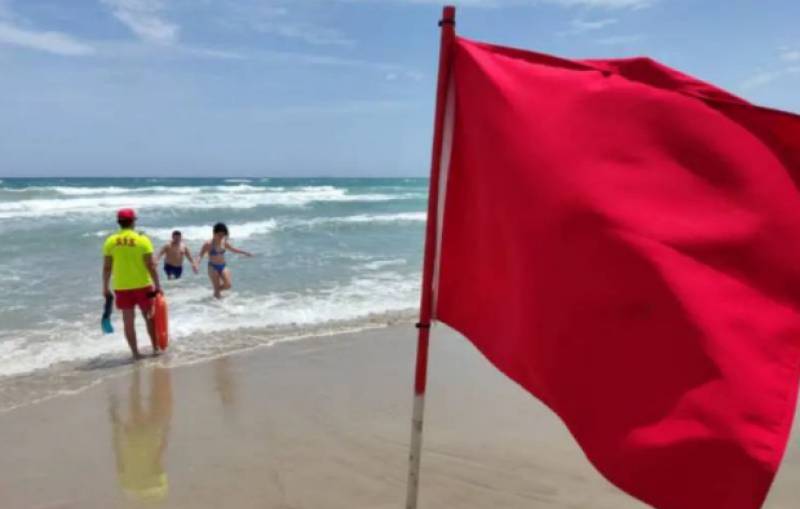- Region
- Vega baja
- Marina Alta
- Marina Baixa
- Alicante
- Baix Vinalopo
- Alto & Mitja Vinalopo
-
ALL TOWNS
- ALICANTE TOWNS
- Albatera
- Alfaz Del Pi
- Alicante City
- Alcoy
- Almoradi
- Benitatxell
- Bigastro
- Benferri
- Benidorm
- Calosa de Segura
- Calpe
- Catral
- Costa Blanca
- Cox
- Daya Vieja
- Denia
- Elche
- Elda
- Granja de Rocamora
- Guardamar del Segura
- Jacarilla
- Los Montesinos
- Orihuela
- Pedreguer
- Pilar de Horadada
- Playa Flamenca
- Quesada
- Rafal
- Redovan
- Rojales
- San Isidro
- Torrevieja
- Comunidad Valenciana
article_detail
What the different coloured beach flags mean in Spain
Knowing your flags could help avoid tragedy on your next beach holiday in Spain

Spain’s vibrant tapestry of diverse landscapes offers no end of destinations to cater to every traveller’s whim, from cosmopolitan cities and historic sites to breathtaking mountains and tranquil lakes. But it’s fair to say that most holidaymakers are drawn by the sun, sea and sand offered by the coastal resorts, and the shores of the costas are packed with discerning tourists every summer.
Spain has more than 3,000 beaches spread across its approximately 8,000 kilometres of coastline and on most of them, Red Cross or Civil Protection personnel keep a keen daily eye, especially in summer. One of their most important jobs is hoisting the coloured flags, designed to inform beach-goers about the state of the water and whether or not it is safe to swim.
Sadly, each year these warning signs either go unnoticed or aren’t properly understood, and tragedy ensues.
So, before your hit the beach this summer, get to know your flags and swim in safety.
The four coloured flags used on Spanish beaches
- Green: Bathing in the sea is allowed and water conditions are ideal for swimming.
- Yellow: Swimming is allowed, but bathers should take care as there’s a chance of waves, strong currents, pollution or marine animals. When the yellow flag is flying, beach-goers are advised not to swim out beyond their depth.
- Red: Swimming is strictly prohibited. If you see a red flag on the beach, it means there’s a high risk to your safety if you venture into the water due to adverse conditions, which could include strong waves, treacherous currents or the presence of dangerous animals, like sharks.
- Orange: Lifeguard not on duty.
Other flags
In addition to the four statutory sea state flags, there are other official flags that are used less regularly:
- Black flag: Indicates that the beach is closed. Entering the water is completely prohibited as it poses a great safety risk. In addition, this colour sometimes also indicates that you cannot walk on the sand.
- Blue flag: This is a seal of quality that indicates that it is one of the best beaches in Spain. Coveted Blue Flags are awarded each year to shorelines that stand out for things like the quality of their water, the services and facilities they offer, security, accessibility, environmental protection etc.
- Flag with jellyfish: Indicates that there are lots of jellyfish in the water that could potentially pose a danger to swimmers.
- Yellow flag with black dot: This flag shows that boats and surfboards aren’t allowed.
- Black and white chequered flag: This flag signifies a surf zone and warns bathers that swimming is dangerous.
- White and blue flag: Indicates that it is a diving area, and that boats cannot pass through.
Also of interest: The beaches in Spain where you are likely to spot a shark
Image: Archive
staff.inc.ali
Loading
Sign up for the Spanish News Today Editors Roundup Weekly Bulletin and get an email with all the week’s news straight to your inbox
Special offer: Subscribe now for 25% off (36.95 euros for 48 Bulletins)
OR
you can sign up to our FREE weekly roundup!
Read some of our recent bulletins:
Discount Special Offer subscription:
36.95€ for 48 Editor’s Weekly News Roundup bulletins!
Please CLICK THE BUTTON to subscribe.
(List price 3 months 12 Bulletins)
Read more stories from around Spain:
Contact Murcia Today: Editorial 000 000 000 /
Office 000 000 000





















